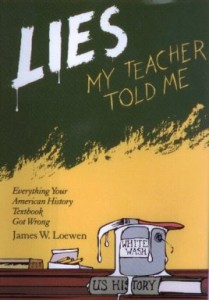
This week’s open thread will cover interesting historical facts from two books by James W. Loewen. I have read several of Loewen’s books, since I am a history nut. I have discovered some great information and I thought I would share. He is also the author of Sundown Towns, which tied into my previous posts on them.
James W. “Jim” Loewen (born February 6, 1942) is an American sociologist, historian, and author, best known for his 1995 book,Lies My Teacher Told Me: Everything Your American History Textbook Got Wrong, which was republished in 2008.
Loewen first taught in Mississippi at Tougaloo College, a historically black college founded by the American Missionary Association after the American Civil War. For twenty years, Loewen taught about racism at the University of Vermont. Since 1997, he has been a Visiting Professor of Sociology at The Catholic University of America in Washington, D.C.
Loewen spent two years at the Smithsonian Institution, where he studied and compared twelve American history textbooks then widely used throughout the United States. He published his findings in Lies My Teacher Told Me: Everything Your American History Textbook Got Wrong (1995). He concluded that textbook authors propagate factually false, Eurocentric, and mythologized views of history. The New Press in March 2012 listed Lies My Teacher Told Me as their top all-time bestseller.
He believes that history should not be taught as straightforward facts and dates to memorize, but rather analysis of the context and root causes of events. Loewen recommends that teachers use two textbooks, so that students may realize the contradictions and ask questions, such as, “Why do the authors present the material like this?”
In the book, Loewen points out that much of the distortions found in American History texts are “not even by the authors whose names grace the cover.
The first set of historical inaccuracies are:
1. What your history teacher told you: Helen Keller’s was just a blind and deaf girl who was an inspiration to everyone. Once she left school, she lived a normal life or nothing is told about her life as an adult.
The truth: When Helen Keller became an adult, she was a radical socialist who sympathized with Russia’s communist regime. She helped founded the American Civil Liberties Union, she supported the NAACP by sending $100 with a letter of support that appeared in the NAACP magazine in the 1920’s. Radical for a white person in Alabama to do. Because of her beliefs, she went from being famous to notorious. The public that saw her disabilities as not being a deterrent to her intelligence or now emphasizing the complete opposite.
2. What your history teacher told you: Woodrow Wilson is the President known for leading the US out of WWI. He established the League of Nations, dealt with women’s suffrage and other progressive causes.
The truth: Wilson was an unrepentant racist and a huge interventionist in foreign countries. Under Wilson,the U.S. intervened in Latin America more often than any other time in history. Wilson republican predecessor had routinely appointed blacks to important offices, African-Americans also had access to the White House and took part in the Republican Party’s national convention. Wilson was an outspoken white supremacist. His wife was even worse and told “darky” stories in cabinet meetings. Wilson re-segregated the federal government. He was openly hostile to black people, because he felt that they were inferior.
3. What your history teacher told you: Betsy Ross is widely credited with making the first American flag and changing the stars on the flag from six-pointed to easier-to-produce five-pointed stars.
The truth: Betsy Ross never did anything. She played no role whatsoever in the actual creation of the first flag. Ross came into prominence around 1876, when some of her descendants, seeking to create a tourist attraction in Philadelphia largely invented the myth of the first flag.
4. What your history teacher told you: Christopher Columbus discovered America on October 12, 1492
The truth: People from other continents had reached America many times before 1492. Columbus’s voyage was the last discovery of the Americas. There were travelers from Asia and Africa who touched the Americas before Columbus did.

